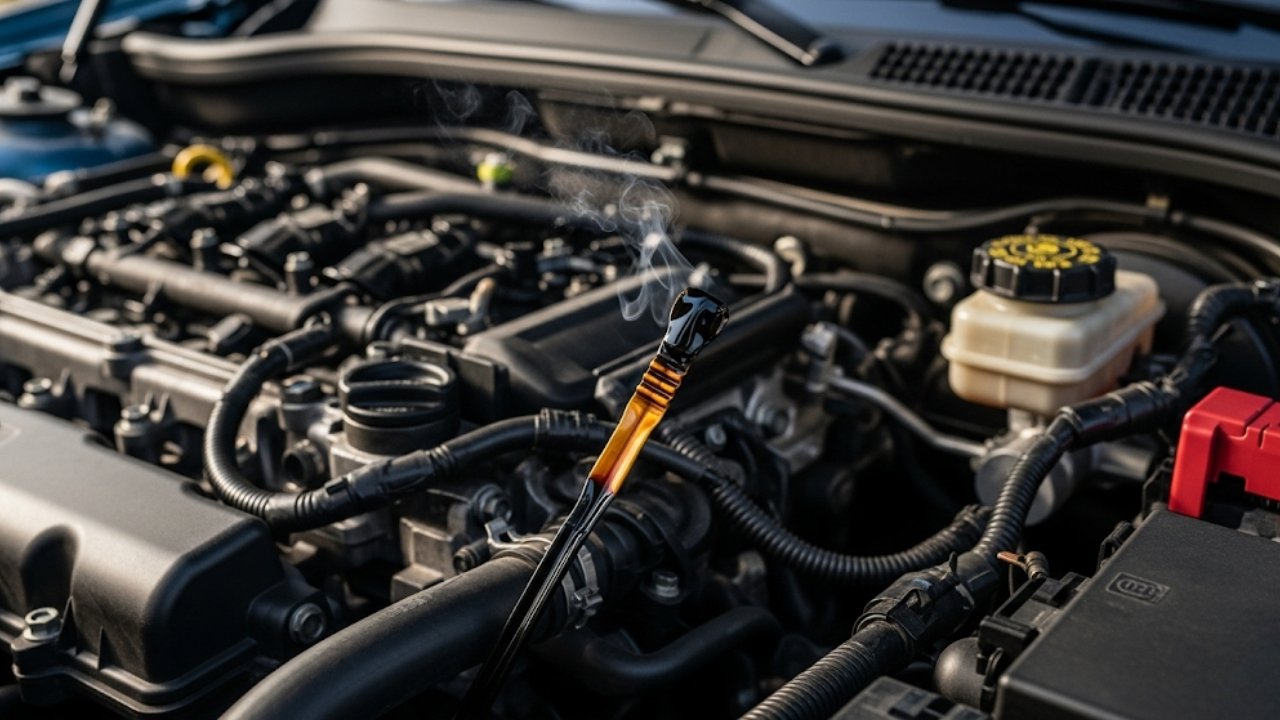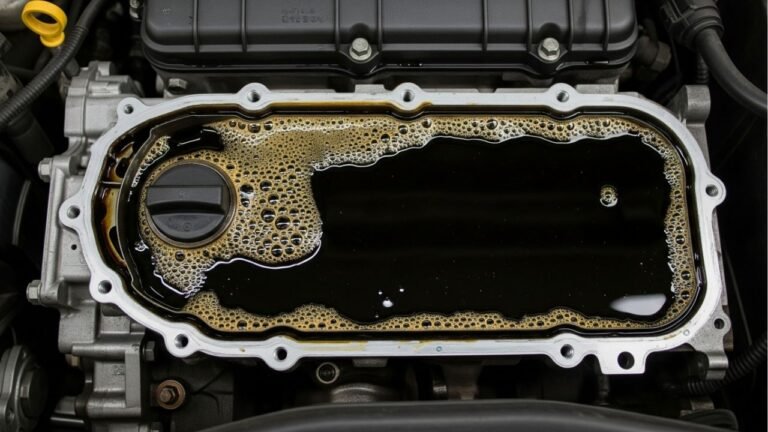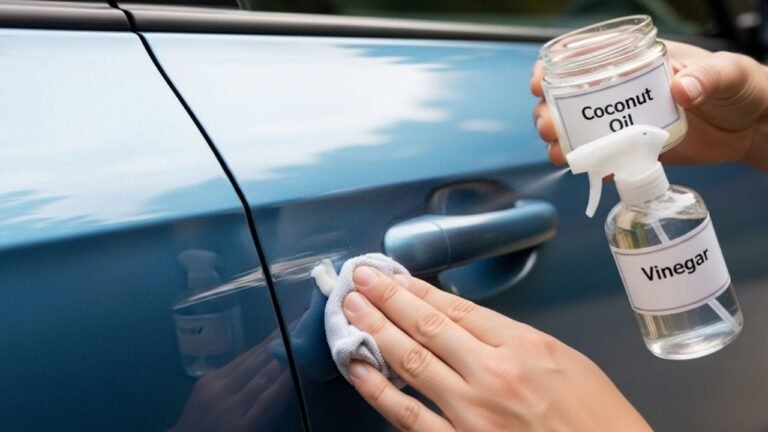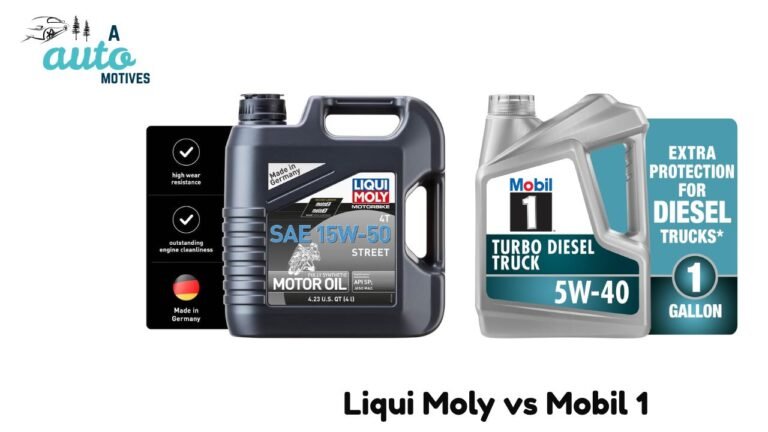Why Does My Car Oil Smell Like Gas? A Friendly Guide

Ever popped your car’s hood, pulled out the dipstick, and caught a whiff of something strange—something like gasoline? If you’re anything like me, your first reaction was probably confusion, maybe a little worry. That gas smell in car oil isn’t something most of us expect.
But you’re not alone. Many drivers notice this odd odor and aren’t sure what it means. The thing is, it’s not just about the smell—it can signal something deeper going on under your hood. It’s like your car is trying to whisper, “Hey buddy, we’ve got a problem brewing.”
This guide breaks it all down in a casual, easy-to-understand way. We’re going to explore why your engine oil smells like gas, what causes it, and how you can fix it before it leads to bigger problems. You’ll get stories, tips, real talk, and just enough technical insight to feel in control—no mechanic degree needed.
What Does It Mean When You Smell Gas in Engine Oil?

A small amount of fuel might mix into oil naturally over time, especially in cold climates or on short drives. But if that fuel smell gets strong, you’re dealing with more than just the usual residue. It could mean:
-
Faulty fuel injectors
-
A stuck open fuel pressure regulator
-
Piston ring problems
-
Frequent short trips without warming the engine
-
An overly rich air-fuel mixture
Let’s unpack each of these causes with some real-life flavor.
The Top Reasons Why Gas Leaks into Engine Oil
We’re diving into the meat of the issue now. Below are the most common reasons for that gas smell in car oil, explained in a way you’ll actually enjoy reading.
1. Faulty Fuel Injectors: When They Leak Instead of Spray
Fuel injectors are like precise chefs. They’re supposed to deliver the exact amount of gas needed, at the right time, into the combustion chamber. When one of them goes rogue—leaking fuel into the cylinder—it can mess everything up.
Imagine pouring soup into your gas tank when the engine’s off. That’s what a leaky injector does. It dumps raw fuel into the cylinders even when the engine isn’t running. That excess gas drips down past the piston rings and into the oil pan.
Symptoms might include:
-
Rough starts
-
Poor fuel economy
-
Strong fuel smell around the engine
If you catch it early, replacing the injector might be enough. But left alone? It can destroy your oil’s ability to lubricate, and that’s a fast track to engine damage.
2. Short Trips: The Hidden Culprit of Suburban Life
Here’s a little story. Back when I was commuting only a mile to work, I noticed my oil level kept rising and smelled like gas. Turns out, short trips don’t let your engine get hot enough to burn off fuel vapors.
When the engine stays cool, fuel condenses and slips past the pistons into the crankcase. It slowly dilutes the oil, making it thinner and less effective.
So, if your routine includes lots of quick errands or cold starts, the gas smell in your oil might just be lifestyle-related. The fix? Take the scenic route once in a while. Let that engine warm up fully. Your oil will thank you.
3. Overly Rich Air-Fuel Mixture: More Fuel Than Your Engine Can Handle
Your car’s ECU (engine control unit) decides how much fuel to send into the engine. But sometimes, sensors go haywire—especially the oxygen sensor or mass airflow sensor—and it tells the engine to use more fuel than needed.
That unburnt fuel ends up washing down the cylinder walls, sneaking into the oil pan, and tainting your oil with gasoline. The result? That unmistakable gas smell in car oil and potential long-term wear.
Common signs include:
-
Black smoke from the tailpipe
-
Poor fuel mileage
-
Engine misfires
This one’s often sensor-related, and a quick OBD-II scan at your local auto store can usually spot it.
4. Piston Ring Wear: When Oil and Gas No Longer Stay in Their Lanes
Piston rings are your engine’s bouncers. They keep fuel and air in the combustion chamber and oil in the crankcase. When they get worn or damaged, fuel can sneak past, mix with oil, and you guessed it—give off that gasoline smell.
It’s more common in older engines or those with high mileage. You might notice:
-
Blue smoke from the exhaust
-
High oil consumption
-
Loss of power
This one’s serious. If the rings are toast, you’re looking at a rebuild or at least a top-end engine overhaul.
5. Stuck Open Fuel Pressure Regulator: Fuel Flooding Your System
Another overlooked cause is a fuel pressure regulator stuck open. This can push too much fuel into the injectors, leading to—you guessed it—unburned gas dripping into the oil.
It’s a bit like trying to drink from a firehose. The engine can’t handle it all, and the excess ends up contaminating your oil.
Signs you’ve got this issue:
-
Engine flooding
-
Fuel in vacuum lines
-
Sooty spark plugs
This repair is usually not too expensive if caught early, but the longer it runs rich, the more damage is done.
Table: Quick Comparison of Causes and Symptoms
| Cause | Symptoms | Fix |
|---|---|---|
| Leaky fuel injector | Rough idle, poor MPG, strong gas odor | Replace injector |
| Short trips | Rising oil level, faint fuel smell | Drive longer occasionally |
| Rich air-fuel mixture | Black smoke, misfire, bad mileage | Check sensors, fix ECU inputs |
| Worn piston rings | Blue smoke, loss of power, oil loss | Rebuild engine or replace rings |
| Stuck fuel pressure regulator | Flooding, fuel in vacuum line | Replace regulator |
Dangers of Gas in Engine Oil: Why It Matters
Now, here’s the part most folks overlook. Gas smell in car oil isn’t just weird—it’s dangerous. Even small amounts of gasoline in your engine oil dilute its viscosity, making it thinner. Thin oil means:
-
Less lubrication
-
Higher engine temps
-
Increased wear and tear
Over time, it can lead to premature engine failure. Think of it as cooking with old, watered-down oil. Sure, it might still fry something, but your food—and in this case, your engine—won’t turn out well.
How to Check for Gas in Oil (Without a Lab Coat)
You don’t need to be a mechanic to check for fuel in engine oil. Here’s how I do it, and you can too:
-
Smell the dipstick – Pull it out and sniff. If it smells like gasoline, that’s a red flag.
-
Look at oil color – Gas-contaminated oil often looks thinner or watery.
-
Check oil level – If it’s mysteriously rising, it might be diluted with gas.
-
Rub it between fingers – It’ll feel slicker or thinner than usual.
If anything seems off, don’t wait. The sooner you act, the better chance you have of avoiding real engine damage.
How to Fix Gas Smell in Car Oil: Simple Steps and Smart Solutions
Now that we’ve nailed the “why,” let’s focus on the “how.” Getting rid of the gas smell in car oil starts with identifying the root cause. But in most cases, these are your action steps:
Step 1: Change the Oil Immediately
If gas has already mixed with your oil, don’t wait. Get that stuff out of there. Even if you’re unsure of the exact cause, a fresh oil change gives your engine a clean slate and helps limit wear.
-
Use the correct oil grade
-
Replace the oil filter too
-
Keep an eye on the new oil—if it smells like gas again soon, the issue is ongoing
Changing oil regularly helps your engine recover, even if the problem lingers for a while.
Step 2: Diagnose the Fuel System
Use an OBD-II scanner or visit a trusted mechanic to:
-
Check for error codes
-
Inspect fuel injectors
-
Examine the fuel pressure regulator
Sometimes the fix is as simple as cleaning or replacing a bad sensor or repairing a leaky injector. Don’t ignore the signs—your car is practically begging for attention.
Step 3: Fix Driving Habits
You’d be surprised how much short trips contribute to this issue. If you:
-
Only drive in town
-
Rarely go beyond 10–15 minutes
-
Frequently start the engine in cold weather
…then your engine probably isn’t reaching optimal temperature. This means gas vapor doesn’t fully burn, and it ends up mixing with oil.
Here’s a tip that works wonders: Take your car for a highway drive once a week. Let it stretch its legs. Warm it up properly. Think of it like a jog for your engine—it keeps it healthy and lean.
Step 4: Check the PCV Valve
The PCV (Positive Crankcase Ventilation) valve might seem small, but it plays a big role in managing fuel vapors. If it’s clogged or malfunctioning, gas fumes can accumulate in the crankcase and taint your oil.
Replace it if:
-
You hear a whistling sound
-
The valve looks oily or dirty
-
It hasn’t been changed in 50,000+ miles
Luckily, PCV valves are cheap and easy to swap on most cars.
How to Prevent Fuel from Contaminating Oil Long-Term
If you’ve dealt with this problem once, you probably don’t want it again. Prevention is easier than most people think. Here’s how you can keep that gas smell in car oil from coming back:
✅ Stick to a Regular Maintenance Schedule
-
Change your oil every 3,000–5,000 miles or as recommended
-
Clean or replace spark plugs
-
Inspect fuel injectors annually
✅ Warm Up Your Engine Fully
Letting your engine reach full operating temperature burns off fuel residues before they can mix with oil.
✅ Use Top-Tier Fuel
Some cheaper fuels contain more additives that leave residue behind. Go for high-quality gas from reputable brands when possible.
✅ Avoid Constant Idling
Idle engines don’t burn fuel efficiently, which increases the chances of fuel contamination in your oil system.
Personal Story: The Gas Smell That Saved My Engine
A couple of winters ago, I was using an older Honda Civic for daily errands—mostly short, 5-minute drives to the corner store or work. One day, while checking the dipstick (yes, I’m old-school like that), I noticed it didn’t just look runny—it smelled like straight gas.
Turns out, the cold, short trips were keeping the engine from burning off excess fuel. That gas was slipping past the rings into the oil. If I hadn’t caught it early and changed the oil, I could’ve damaged the engine.
Moral of the story? Trust your nose. If something smells off, it probably is.
FAQs About Gas Smell in Car Oil
1. Is it normal for oil to smell like gas a little bit?
A faint smell isn’t unusual, especially in colder weather or after short trips. But a strong, persistent gas smell in car oil suggests something’s wrong and should be checked immediately.
2. Can I drive with gas in my oil?
Technically, yes—for a short while. But it’s not safe. The oil won’t protect your engine properly, which leads to increased friction, overheating, and eventual engine damage.
3. Will fuel in oil burn off while driving?
Not always. Some gas might evaporate during long drives if it’s only a trace amount. But once fuel is thoroughly mixed with oil, the only real solution is an oil change.
4. What happens if I ignore the gas smell in my oil?
Ignoring it can:
-
Lower oil viscosity
-
Cause overheating
-
Damage bearings and cylinder walls
-
Lead to engine failure
5. Can a fuel smell in oil come from a bad fuel pump?
It’s rare, but if a bad pump delivers too much fuel, it can cause rich running, leading to fuel washdown that enters the oil system.
6. Is synthetic oil more resistant to gas contamination?
Synthetic oil offers better protection overall, but it’s not immune. Once contaminated with fuel, it should still be changed promptly.
7. How much gas in oil is too much?
Even a small percentage (over 2-3%) is considered excessive. If your oil smells strongly of gasoline, it likely needs immediate attention.
8. Can a cold engine make gas smell more noticeable?
Yes! Cold engines burn less efficiently, especially on short drives. That means more raw fuel can slip past the cylinders, especially in older vehicles.
Final Thoughts: What That Gas Smell Is Trying to Tell You
Your car is like a person—it has ways of communicating when it’s not feeling well. That gas smell in car oil? It’s your engine waving a red flag. And while it might seem like a minor nuisance, it can lead to big, expensive problems if left unchecked.
But here’s the good news: You don’t need to be a car expert to stay ahead of it. A few good habits—like regular oil checks, avoiding short trips, and fixing problems early—can make a huge difference.
So next time you’re checking your oil and get that sharp, gassy whiff, don’t ignore it. Listen to your car. Smell the signs. Act before things get messy under the hood.






